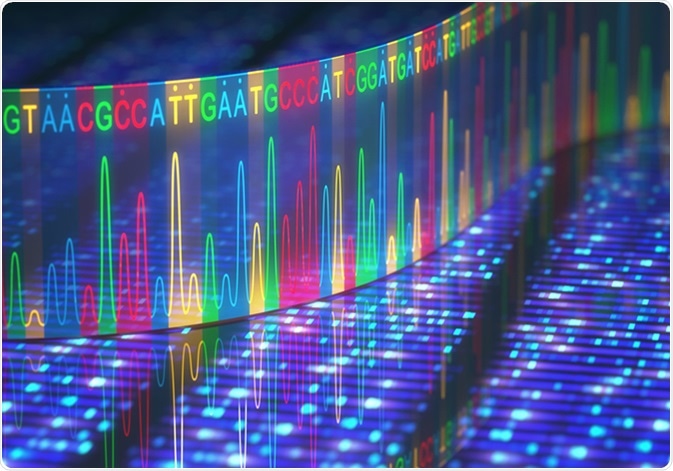The first DNA sequencing method was developed by Frederick Sanger in 1977. The technique was based on incorporation of chain-terminating dideoxynucleotides by DNA polymerase while replicating DNA. So instead of many copies of the full DNA chain, there would be copies of all different lengths of the chain, ending at each link, for every link of the chain. These sequences can then be separated using polyacrylamide gel electrophoresis.

3D illustration of a method of DNA sequencing. Image Credit: ktsdesign / Shutterstock
The ingredients for Sanger sequencing are:
- a single-stranded DNA template
- primers to begin the new DNA chain
- DNA polymerase
- normal deoxynucleosidetriphosphates (dNTPs)
- chain-terminating di-deoxynucleosidetriphosphates (ddNTPs)
The ddNTPs have a fluorescent or radioactive label attached for detection. Chain-terminating ddNTPs lack an OH group at the 3-prime end (3’-OH) of the molecule. This is where the next nucleotide would be attached by a phosphodiester bond if the sequence continued.
How does Sanger Sequencing Work? – Seq It Out #1
The Protocol
Four sequencing reactions are created for each of the nucleotides present in DNA: adenosine, guanine, cytosine, and thymine. One of the four deoxynucleotides (dATP, dGTP, dCTP, or dTTP) is added to each reaction vessel.
DNA synthesis begins from a primer bound to the template strand. A second strand is assembled on top of the template, creating a double stranded DNA. At the end of the process, in each reaction vessel, the chain terminates whenever a ddNTP is randomly incorporated, resulting in chains whose length corresponds to all locations of that specific nucleotide.
In the vessel with dATP, for example, there would be chains terminating at each A position, and so forth. The reaction vessel is heated, separating the chains, and then cooled again so that the reaction restarts with fresh primers. The reaction is typically thermally cycled about thirty-five times. Traditionally the reactions are separated side-by-side on a gel, and the result can be “read” from left to right, top to bottom.
Given the size and complexity of the genome, this method can be laborious to carry out by hand for any but the shortest of sequences. Sanger sequencing is now usually automated, thus a sequencing machine runs dozens of DNA batches per day and separates the chains by capillary electrophoresis. A further step in automating and simplifying the process is to perform the whole reaction on a microfluidic chip.
Dye Terminator Method
One advance on Sanger sequencing is the dye-terminator method. Instead of carrying out four reactions in four different vessels using labeled primers, the different ddNTPs are labeled with fluorescent dyes, each emitting at a different wavelength, so the four bases will show up as different colors when run simultaneously on a gel. Dye-terminator Sanger sequencing is now the method of choice for automated sequencing due to its relative simplicity.
Sanger sequencing can read chains up to about 800 base pairs. It is a foundational genomics method and is still used for many applications requiring short read lengths. However, during the 80’s and 90’s, molecular biologists began working toward sequencing the entire human genome, which contains about three billion base pairs.
Researchers also wanted to carry out whole genome sequencing on other species. Therefore newer methods including shotgun sequencing, Illumina sequencing, and next-generation sequencing have been developed to meet the challenge of sequencing whole genes and genomes.
Further Reading
Last Updated: Feb 26, 2019